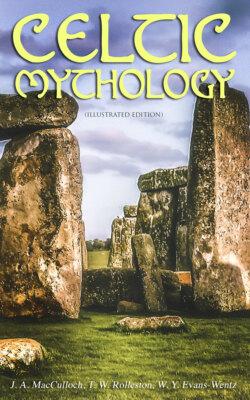Читать книгу CELTIC MYTHOLOGY (Illustrated Edition) - T. W. Rolleston - Страница 36
На сайте Литреса книга снята с продажи.
The Religion of Magic
ОглавлениеThis triple division is reflected more or less in all the Celtic countries, and must always be borne in mind when we speak of Celtic ideas and Celtic religion, and try to estimate the contribution of the Celtic peoples to European culture. The mythical literature and the art of the Celt have probably sprung mainly from the section represented by the Lowland Celts of Bertrand. But this literature of song and saga was produced by a bardic class for the pleasure and instruction of a proud, chivalrous, and warlike aristocracy, and would thus inevitably be moulded by the ideas of this aristocracy. But it would also have been coloured by the profound influence of the religious beliefs and observances entertained by the Megalithic People—beliefs which are only now fading slowly away in the spreading daylight of science. These beliefs may be summed up in the one term Magic. The nature of this religion of magic must now be briefly discussed, for it was a potent element in the formation of the body of myths and legends with which we have afterwards to deal.
The ultimate root of the word Magic is unknown, but proximately it is derived from the Magi, or priests of Chaldea and Media in pre-Aryan and pre-Semitic times, who were the great exponents of this system of thought, so strangely mingled of superstition, philosophy, and scientific observation. The fundamental conception of magic is that of the spiritual vitality of all nature. This spiritual vitality was not, as in polytheism, conceived as separated from nature in distinct divine personalities. It was implicit and immanent in nature; obscure, undefined, invested with all the awfulness of a power whose limits and nature are enveloped in impenetrable mystery. In its remote origin it was doubtless, as many facts appear to show, associated with the cult of the dead, for death was looked upon as the resumption into nature, and as the investment with vague and uncontrollable powers, of a spiritual force formerly embodied in the concrete, limited, manageable, and therefore less awful form of a living human personality. Yet these powers were not altogether uncontrollable. The desire for control, as well as the suggestion of the means for achieving it, probably arose from the first rude practices of the art of healing. Medicine of some sort was one of the earliest necessities of man. And the power of certain natural substances, mineral or vegetable, to produce bodily and mental effects often of a most startling character would naturally be taken as signal evidence of what we may call the “magical” conception of the universe.6 The first magicians were those who attained a special knowledge of healing or poisonous herbs; but “virtue” of some sort being attributed to every natural object and phenomenon, a kind of magical science, partly the child of true research, partly of poetic imagination, partly of priestcraft, would in time spring up, would be codified into rites and formulas, attached to special places and objects, and represented by symbols. The whole subject has been treated by Pliny in a remarkable passage which deserves quotation at length:
